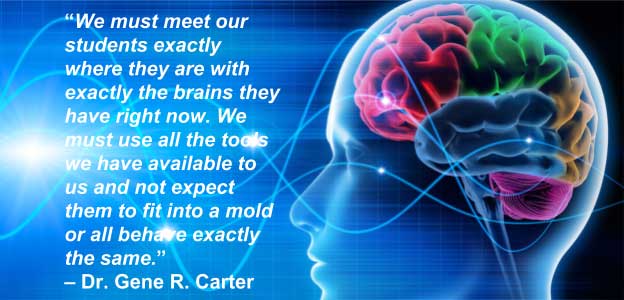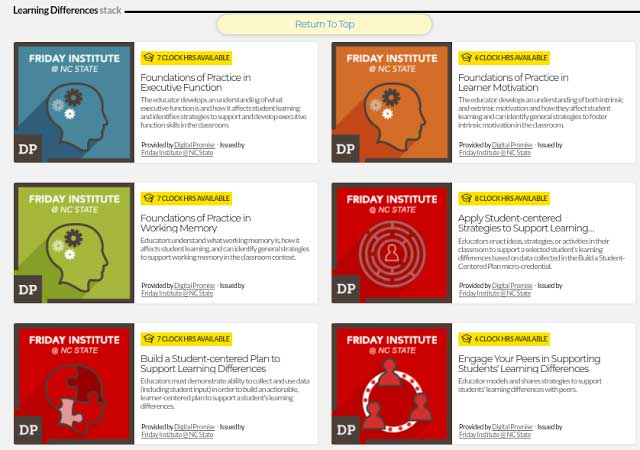Address Learning Differences with These Micro-credentials from @DigitalPromise

Innovative educators know the importance of understanding how a student learns best and then designing an approach tailored that student’s needs. This comes in the form of learning that is student centered, differentiated, and takes into account the learner’s differences and preferences. It also means having a class load that makes this manageable and using resources like Thrively or Personal Success Plans to tap into students individual passions, talents, interests, abilities, and learning styles.
However, while educators who have these skills will be more effective at supporting student learning, a teacher’s preservice program may not have fully addressed this. As a result, educators must learn on the job, by reading articles, attending workshops (if they are offered and able) and speaking to others face-to-face and online. While this is helpful, there is now a way to jump-start, document, and become recognized for developing this expertise.
Credentialing teachers in addressing learning differences
The Friday Institute for Educational Innovation is offering their learning differences course at no cost as part of a 10-part micro-credential stack from Digital Promise. These micro-credentials provide a competency-based, personalized, way to learn on demand the many aspects contributing to how students learn, from the way our brain processes information to the impact of emotional intelligence on learning.
Research-based approach
Educators who complete the stack are able to bring into practice a more personalized instructional approach, focusing on each student’s individual learning strengths and needs. Each micro-credential begins with an overview of a construct or idea in personalized learning that is supported by the latest research to help educators gain a deeper understanding of its importance in the learning process. Educators are then asked to identify a student’s strengths and challenges and create and implement a plan that supports the student in meeting their goals for learning.
Below are the topics about which some of the micro-credentials are focused.
Tools and ideas to transform education. Sign up below.

Educators who have earned the micro-credentials say they have found it extremely empowering to have the language and knowledge to not only define the specific needs of their students, but also determine ways to meet them best. Rather than providing whole class instruction or grouping their students into broad categories, they have the ability recognize their students as individual learners and the tools to ensure they are able to support learning based on their unique strengths, talents, interests, abilities, and learning styles.
Assessment and credit
Upon completion of each micro-credentials teachers submit their work to assessors who determine if the educator has successfully demonstrated competency. If they have, they earn a micro-credential in the form of a digital badge that they can display on their resume, LinkedIn profile, social media sites, and email signature to demonstrate their skill set and stand out from the rest. Because micro-credentials are competency-based, the learning is visible allowing an interested party to in essence, look under the hood, and see all the elements that lead to acquiring competency in this skill or area.
Many states such as New York, Texas, Montana, and Massachusetts provide formal PD credit for successful completion of micro-credentials. There is also an option to pay a nominal fee and receive graduate credit from accredited university partners such as University of San Diego and Portland State University.
Lisa Nielsen writes for and speaks to audiences across the globe about learning innovatively and is frequently covered by local and national media for her views on “Passion (not data) Driven Learning,” "Thinking Outside the Ban" to harness the power of technology for learning, and using the power of social media to provide a voice to educators and students. Ms. Nielsen has worked for more than a decade in various capacities to support learning in real and innovative ways that will prepare students for success. In addition to her award-winning blog, The Innovative Educator, Ms. Nielsen’s writing is featured in places such as Huffington Post, Tech & Learning, ISTE Connects, ASCD Wholechild, MindShift, Leading & Learning, The Unplugged Mom, and is the author the book Teaching Generation Text.
Disclaimer: The information shared here is strictly that of the author and does not reflect the opinions or endorsement of her employer.
Lisa Nielsen (@InnovativeEdu) has worked as a public-school educator and administrator since 1997. She is a prolific writer best known for her award-winning blog, The Innovative Educator. Nielsen is the author of several books and her writing has been featured in media outlets such as The New York Times, The Wall Street Journal, and Tech & Learning.
Disclaimer: The information shared here is strictly that of the author and does not reflect the opinions or endorsement of her employer.
